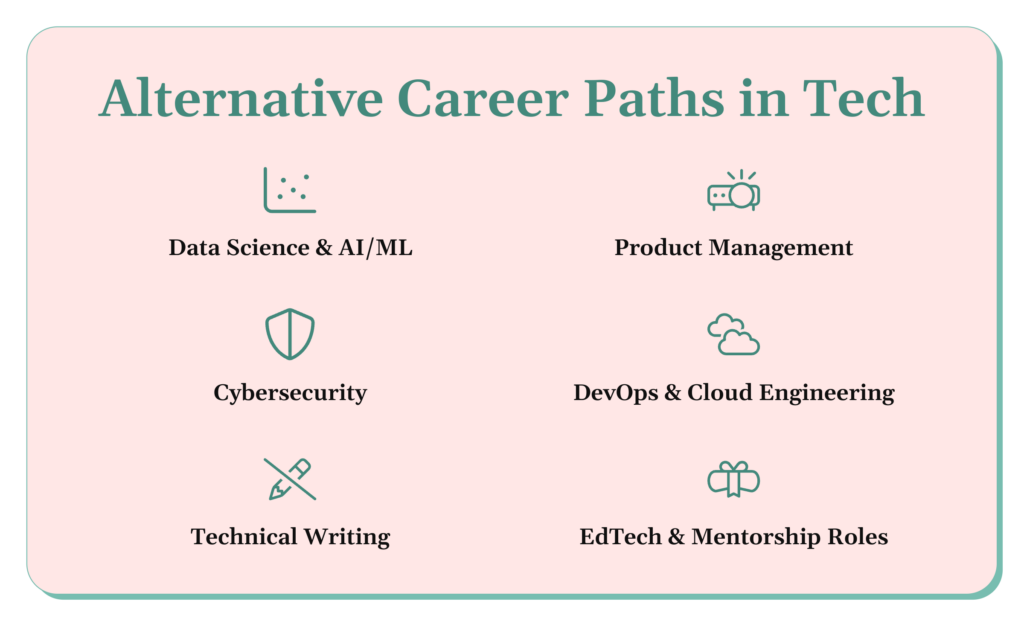

Quick Summary
Thinking about how to become a software engineer and live a life among people who are always pursuing creating something new? Then you are at the right place; here in this article, you will learn everything from what a software engineer does to a step-by-step guide on how to become a software engineer. So, keep reading the article till the end to learn about software engineering and how to become a software engineer in India to join forces with another 5.2 million and create a crowned career in this field.

A software engineer designs, develops, tests, and maintains software applications, systems, and platforms. They use programming languages, engineering principles, and problem-solving skills to create software that solves real-world problems or improves business efficiency.
Software engineering has emerged as one of India’s most sought-after career paths—and for good reason. With the country rapidly evolving into a global technology hub, the demand for skilled software professionals is booming. Here are some compelling reasons why choosing software engineering as a career in India can be a wise and rewarding decision:
India is home to one of the largest IT industries in the world. From multinational tech giants to innovative startups, the demand for software engineers is consistently high across sectors like finance, healthcare, e-commerce, edtech, and more. Whether you specialize in front-end development, back-end architecture, or full-stack solutions, opportunities are abundant.
Software engineers in India enjoy competitive salaries, with compensation growing significantly as you gain experience and specialize in high-demand technologies like artificial intelligence, cloud computing, blockchain, and data science. Even entry-level roles offer above-average pay compared to many other fields.
Tech companies often promote merit-based growth, allowing engineers to quickly move up the career ladder—from developer to tech lead, solution architect, or CTO. Many Indian software engineers work on international projects or relocate abroad through global firms.
The software industry in India has embraced remote and hybrid work cultures. This flexibility allows for better work-life balance, location independence, and the ability to work for global companies from anywhere in India.
Software engineering constantly evolves. Indian professionals often work with cutting-edge tools and frameworks, allowing continuous learning. From hackathons to open-source contributions, the industry fosters innovation and creativity.
With technical skills in hand, many software engineers in India go on to launch their own startups or freelance globally. The tech ecosystem in cities like Bengaluru, Hyderabad, and Pune provides a strong support network for aspiring tech entrepreneurs.
Software engineering is viewed as a prestigious and future-ready career. Engineers often contribute to building products that impact millions—from educational platforms to healthcare apps, making a meaningful difference in people’s lives.
How to become a software engineer in India involves a mix of formal education, practical experience, and continuous upskilling. Whether you’re a student planning ahead or a career switcher, follow these steps to become a software engineer.
How to become a software engineer begins after Class 10 by selecting the Science stream, ideally with Mathematics, Physics, and Computer Science. These subjects develop the analytical and technical skills required in programming and software development. Building a strong academic foundation early on helps students grasp complex coding concepts later and prepares them for entrance exams and higher studies in computer-related fields.
If you are curious how to become a software engineer in India after 10th or 12th grade, you can choose computer science as your optional subject, which will help you understand the subject and its applications. To become a software engineer, you typically need a formal degree in a relevant field. After completing Class 12, pursue:
These programs teach you coding, databases, algorithms, and system architecture—the core building blocks of how to become a software engineer in India.
Mastering the right programming languages is crucial to how to become a software engineer. Begin with Python, known for its beginner-friendly syntax and versatility. Move to JavaScript, which is essential for front-end and full-stack web development. Languages like Java and C++ are widely used in enterprise-level and backend systems, while SQL is fundamental for database management and queries.
Alongside learning languages, aspiring engineers should explore frameworks, cloud computing tools, and core concepts of information technology. Practicing data structures and algorithms and taking on coding challenges or projects will steadily build technical confidence and problem-solving ability.
When exploring how to become a software engineer, real-world experience is just as important as theoretical knowledge. Start building a strong portfolio that showcases your skills and creativity. Include personal projects like apps, websites, or automation tools. Maintain well-documented GitHub repositories to demonstrate your coding proficiency. Take on freelance projects through platforms like Upwork or Fiverr to gain client-based experience. Additionally, contributing to open-source projects shows initiative and collaboration—qualities employers highly value in software engineers.
As a fresher aspiring to become a software engineer, focus on creating a strong, skill-based resume highlighting certifications, projects, and hackathon experience. This resume can open doors to job opportunities on portals, company websites, and through networking. Equally important are internships—they offer real-world exposure, teamwork experience, and practical learning. Target roles in web or app development, QA and testing, data analysis, or backend engineering to gain valuable hands-on experience and boost your employability.
The next step in how to become a software engineer in India is landing your first job. Entry-level roles include Junior Software Developer, Backend Developer, Front-End Developer, and Full-Stack Engineer. To succeed, prepare thoroughly for coding interviews by mastering data structures, algorithms, and basic system design. Practice technical tests and coding rounds on platforms like LeetCode or HackerRank, and don’t overlook behavioral or scenario-based questions that assess your problem-solving and communication skills during interviews.
Continuous upskilling is essential to becoming a successful software engineer. Earn certifications in in-demand technologies like Cloud Computing (AWS, Google Cloud, Azure), DevOps tools (Docker, Jenkins, Kubernetes), or specialized fields such as Cybersecurity, Data Science, or AI/ML. These certifications will keep you updated with the latest industry trends and enhance your credibility, making you a more competitive candidate for top roles in the software engineering field.
Networking is crucial in how to become a software engineer in India, helping you secure job referrals, find mentors, and join learning communities. To network effectively, create a strong LinkedIn profile and join tech meetups, hackathons, and developer forums. Participate in GitHub, Reddit tech threads, and Discord communities to engage with like-minded professionals, share knowledge, and stay updated with industry trends, which will open doors to job opportunities and career growth.
Understanding how to become a software engineer involves more than just coding—it’s about building a mindset of continuous learning, problem-solving, and collaboration. You can thrive in one of India’s most promising career fields with the right strategy and persistence.
Also read: How to Become a Software Architect

Choosing the right course is crucial if you’re serious about mastering how to become a software engineer. India offers a wide range of software engineering courses—from full-time degrees to short-term certifications—catering to beginners, college students, and working professionals. Below are some of the best options:
When choosing a course, consider factors like curriculum relevance, faculty expertise, placement support, peer learning, and cost. No matter your educational background, there’s a learning path that fits your goal of how to become a software engineer in India.

Here is a list of soft and technical skills required in the software profile. Mentioning these engineering skills can boost your resume.
| Technical Skills | Soft Skills |
| C programming Language | Verbal Skills |
| C++ | Written Skills |
| Web Languages: HTML, CSS, JAVAScript | Interpersonal skills |
| Python | Analytical Mind |
| Databases: Oracle, MySQL and Git | Creative Problem-Solving Skills |
| Data Structures and Algorithms | Team Building Skills |
| Machine Learning | Networking Skills |
The career journey of a software engineer is dynamic, flexible, and full of growth opportunities. Whether aiming for technical mastery, leadership roles, or entrepreneurship, the path offers multiple directions. Here’s a look at the typical career path of a software engineer in India and beyond:

With a foundation in software engineering, professionals can also branch out into:
The career path of a software engineer is not fixed—it’s highly customizable based on your interests, skills, and goals. Whether you aspire to be a coding expert, a tech leader, or a startup founder, software engineering opens doors to a future-ready, high-growth career.
Here is a list of top employers who offer software engineer jobs.
| Recruiters | Average Salary |
| Oracle Financial Services | INR 11.3 LPA |
| HCL Technologies | INR 4.8 LPA |
| Infosys | INR 8.4 LPA |
| Microsoft | INR 13 LPA |
| INR 22 LPA | |
| TCS | INR 7.5 LPA |
| Samsung | INR 16.1 LPA |
| Intel | INR 14 LPA |
| Adobe | INR 10 LPA |
| Cisco | INR 18 LPA |
| Deloitte | INR 8 LPA |
| IBM | INR 10 LPA |
| Cognizant | INR 8.4 LPA |
Source: Ambitionbox
Software engineers in India typically earn ₹8.5 LPA on average, with entry-level salaries ranging from ₹3.5 – ₹6 LPA. Mid-level professionals earn ₹7 – ₹15 LPA and senior engineers can earn ₹15 – ₹25+ LPA. Leadership roles like Engineering Managers or CTOs often make ₹30 LPA to ₹80+ LPA. Expertise in cloud technologies, AI/ML, and DevOps can significantly increase earning potential.
To pursue a career as a software engineer, you must have a Bachelor’s degree in Computer Science or a related field. A minimum of 60% in your 12th grade (with Mathematics, Physics, or Computer Science) is typically required to qualify for top engineering colleges through entrance exams like JEE or MHT CET.
Yes, you can! In today’s skill-driven tech world, a formal degree is not mandatory to become a software engineer. Many self-taught professionals have built successful careers through alternate paths.
With the right skills, consistency, and a solid portfolio, you can become a software engineer—even without a degree.
Challenges in a Software Engineering Jobs
While software engineering is a rewarding field, it comes with its own set of challenges. Being aware of these can help you prepare and grow more effectively.
1. Rapidly Evolving Technology
Tech trends change fast—what’s in demand today may become outdated tomorrow. Continuous learning is essential to stay relevant.
2. High Pressure & Tight Deadlines
Projects often come with tight delivery timelines, which can lead to long working hours and burnout if not managed well.
3. Debugging & Problem-Solving Stress
Tracking bugs and fixing complex issues can be frustrating and mentally exhausting, especially under pressure.
4. Work-Life Balance
Depending on the company and role, maintaining work-life balance—especially during releases or critical updates—can be challenging.
5. Communication Gaps
Working in cross-functional teams or with clients across time zones can lead to misunderstandings if communication isn’t clear.
6. Job Market Competition
While demand is high, so is competition. Standing out requires strong skills, projects, and interview readiness.
Overcoming these challenges requires adaptability, resilience, collaboration, and a passion for continuous learning.
Future Scope of Software Engineering in India
The future of software engineering in India looks incredibly bright. As digital transformation accelerates across sectors, the demand for skilled software professionals continues to grow at an unprecedented rate.
1. Expanding Job Market
India is expected to add millions of tech jobs by 2030, driven by growth in AI, cloud computing, data science, cybersecurity, and automation.
2. Thriving Startup Ecosystem
With India becoming a global startup hub, software engineers are increasingly in demand for building innovative tech products and solutions.
3. Global Work Opportunities
Indian developers are working remotely or relocating abroad for top roles in the US, Europe, and Southeast Asia, thanks to global hiring trends.
4. Rise of Emerging Technologies
Opportunities are expanding in areas like AI/ML, blockchain, IoT, AR/VR, and quantum computing, offering exciting new career paths.
5. Government & Private Sector Digitization
Massive initiatives like Digital India, UPI, and smart cities are fueling the need for skilled software professionals at every level.
With strong technical skills and adaptability, software engineers in India can look forward to a high-growth, future-proof career in the years ahead.

If you’re an aspiring software engineer, this quick guide should help you decide if this is the right career path. With strong programming skills and an interest in computer science or IT, how to become software engineer is highly achievable—even more so as technology continues to evolve and create new opportunities.
Once you’re in, the profession offers excellent pay, growth opportunities, and the chance to work with top MNCs. High-demand domains like AI, Data Science, and the Metaverse are adding even more value to this field. Enrolling in software engineering courses can sharpen your skills in coding, data structures, and development practices—giving your career the boost it needs.
Becoming a software engineer usually takes 3–4 years with a B.Tech or B.E. degree. Without a degree, it may take 1–2 years through self-learning, coding bootcamps, and certifications, depending on your consistency, practical experience, and learning approach.
To become a software engineer after the 12th you have to appear in the entrance exam to get admission to top colleges of the countries. Some of these exams are:
1. JEE
2. MHTCET
3. BITSAT
4. VITEEE
5. SRMJEEE
7. MET
1. Learn the basics of computer science
2. Practice coding
3. Build a portfolio of your work
4. Network with other software engineers
5. Start applying for jobs
If you want to grow in your software engineer career and become a Senior Software Developer, these are the steps:
1. Obtain a Solid Foundation in Software Development
2. Gain Practical Experience
3. Expand Your Technical Skill Set
4. Demonstrate Leadership and Initiative
5. Continuously Learn and Improve
To become a software engineer in India, a Bachelor’s degree in Computer Science, Software Engineering, or related fields like B.Tech, BCA, or B.Sc. is typically required. Some advanced roles may prefer a Master’s degree such as M.Tech or MCA.

Authored by, Amay Mathur | Senior Editor




Amay Mathur is a business news reporter at Chegg.com. He previously worked for PCMag, Business Insider, The Messenger, and ZDNET as a reporter and copyeditor. His areas of coverage encompass tech, business, strategy, finance, and even space. He is a Columbia University graduate.
Editor's Recommendations
Chegg India does not ask for money to offer any opportunity with the company. We request you to be vigilant before sharing your personal and financial information with any third party. Beware of fraudulent activities claiming affiliation with our company and promising monetary rewards or benefits. Chegg India shall not be responsible for any losses resulting from such activities.
Chegg India does not ask for money to offer any opportunity with the company. We request you to be vigilant before sharing your personal and financial information with any third party. Beware of fraudulent activities claiming affiliation with our company and promising monetary rewards or benefits. Chegg India shall not be responsible for any losses resulting from such activities.